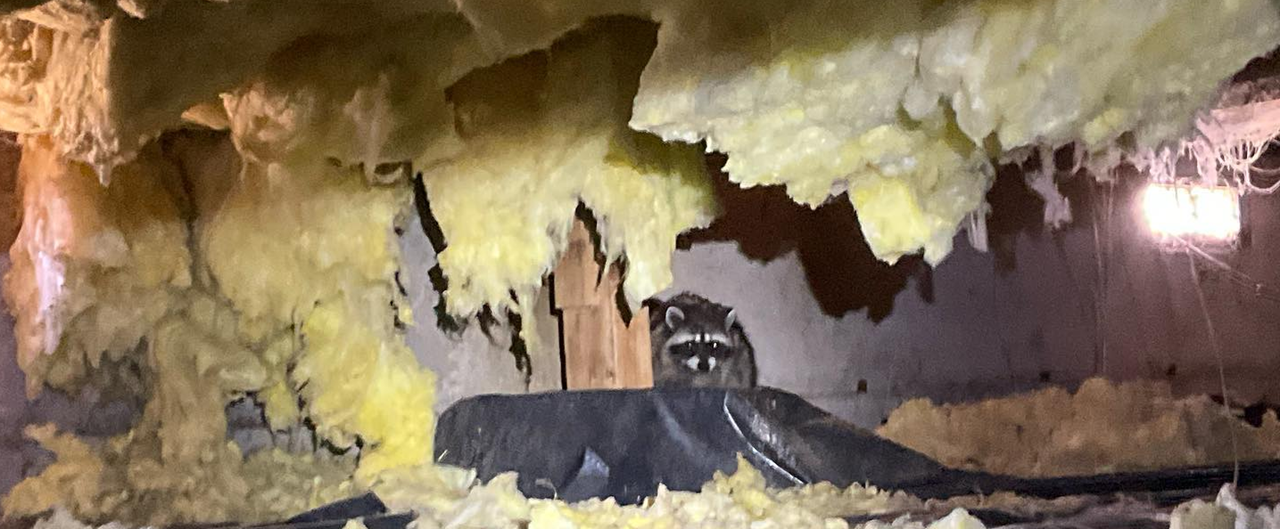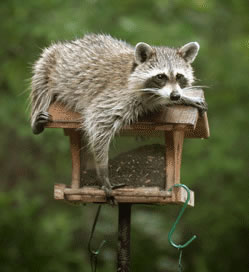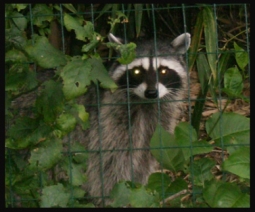
Raccoons are in your yard for food, water, and/or shelter. How can you tell the difference between a raccoon passing through your yard and a raccoon problem? When you see consistently see evidence of raccoons or start to notice damage, you have a raccoon problem.
Need Help with Raccoon Infestation?
Find a Critter Control near you.
The natural habitat for raccoons is wooded areas close to water. Hollow trees are the natural den sites for raccoons. But they have adapted to urban, suburban, and agricultural areas. Raccoons will den in the space under a porch or deck, inside sheds, climb into chimneys, or in your attic.

Easily available food often attracts raccoons to your yard. Raccoons are omivores, eating both plants and animals. Plant foods include fruits, berries, nuts, acorns, corn, and other types of grain.
Animal foods include crayfish, clams, fish, frogs, snails, insects, turtles and their eggs, mice, rabbits, muskrats, and the eggs and young of ground-nesting birds and waterfowl.
Raccoons will happily eat garbage from trashcans, birdseed from birdfeeders, food waste in compost piles, fallen fruit from trees, or unattended pet food.
Raccoons often build dens in tree hollows, under porches, under decks, and in rarely used sheds. These sites offer access to fruits, nuts, insects, outdoor pet food, and garbage.
Signs of Raccoon Problem in Yard
How can you tell the difference between a raccoon passing through your yard and a raccoon problem?
When you see consistently see evidence of raccoons or start to notice damage, you have a raccoon problem.
The presence of raccoons is often marked by their messy eating habits — leaving trash and food scraps behind after feeding. They also rip up sod, steal siding off of homes, and scratch lawn ornaments and fences.
Property owners also may notice raccoon tracks, which can resemble the handprints of human children. Raccoons designate communal spaces to defecate. Latrine sites in your yard are clear signs of a raccoon problem.
Raccoon Damage in the Backyard
Raccoons will damage your yard looking for food sources. Raccoons will dig up lawns and roll up sod looking for earthworms and grubs. They will eat fruits and vegetables, especially sweet corn and watermelons. Chickens are at risk from raccoons. Most chicken coups offer little resistance to raccoons. They’ll eat chickens and eggs.
There are health risks of raccoons in the yard.
These critters establish nearby latrines. Raccoon excrement often contains raccoon roundworms, a parasite capable of killing humans. They’re also capable of spreading rabies and leptospirosis. Raccoons in your backyard are just one step away from perhaps the greatest danger, home infestation.
How to Get Rid of Raccoons in the Back Yard
If you find a raccoon in your yard, do not approach it. Raccoons can carry rabies. Raccoons are naturally shy animals that prefer to retreat when they sense humans nearby, but they will attack when cornered or protecting their young.
Removing access to food sources is the most effective raccoon control. Secure garbage cans with bungee cords. Remove birdfeeders. Keep pet food inside.
Some raccoon deterrents have limited effectiveness. Usually, the raccoon grows accustomed to it. Raccoons are nocturnal so bright lights might work as a deterrent. Motion-activated sprinklers have some effectiveness to keep a raccoon away.
Repellents like vinegar, ammonia, cayenne pepper, or predator urine are not effective outside. The scents dissipate quickly, and raccoons are smart enough to avoid the smell by occupying a separate part of your yard.
An electric fence can protect certain parts of your yard like the vegetable gardens or chicken coops. It is not feasible to install an exclusion device around your entire yard.
Raccoon Removal
Removing raccoons from your property is dangerous and requires the expertise of our trained professionals. If you have problematic raccoons in your backyard, contact Critter Control. A raccoon that has established itself in your yard, can start to look for access points into chimneys, attics, or crawlspaces for shelter.

Get them out.
Keep them out.®
Experiencing a wildlife or pest issue? We can help! Complete this form and your local Critter Control® office will contact you to assist.
- How to Get Rid of Raccoons
- Are Raccoons Dangerous?
- Raccoon Trapping Service
- Raccoon Control
- Baby Raccoons
- Dead Raccoon Removal
- Raccoon Diseases
- Do Raccoons Hibernate in Winter?
- Raccoon Damage
- Raccoon Diet
- Raccoon Poop
- Raccoons in Basements
- Raccoons in Chimneys
- Raccoons in Crawl Spaces
- Raccoons in Houses
- Raccoons in Trash
- Raccoons in Trees
- Raccoons in Walls
- Raccoons on Roofs & in Soffits
- Raccoon Sounds
- Raccoon Tracks
- Raccoons in Attics & Ceilings
- What Does a Raccoon Look Like?